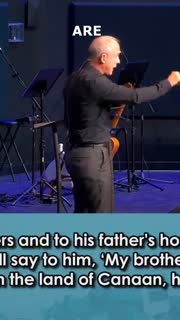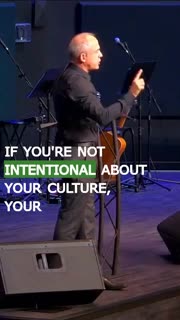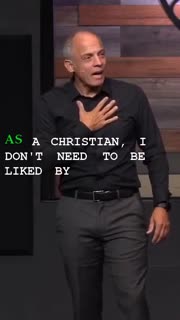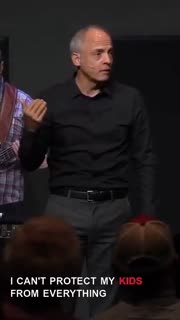Intentional Culture: Shaping Our Families for Eternity
Devotional
Sermon Summary
Bible Study Guide
Sermon Clips
1) "You can determine what your culture is, or you can let culture determine who you are. Let's say that again. You can determine what your culture is, or you can allow culture to determine who you are. And here's why this is so important. Because if you're just allowing culture to happen to you, then culture is going to shape you. And culture is not accidental. The people behind culture, they have an agenda. They're trying to shape the political culture of our country, they're trying to shape the music culture. They're trying to shape the educational culture." [07:24] (42 seconds)
2) "Here's where the biggest part of why culture matters is culture determines not only who you're going to be, but where you are going. The culture of our families will determine where our family goes. The culture of our church will determine where our church goes, the culture of our state, the state of Virginia. And right now, we're in college football, and a lot of times, you'll hear coaches talk about their culture, of their program that determines where their program goes." [08:32] (30 seconds)
3) "Some of you are in homes where you have a toxic culture. And let me just pause and give you a parentheses here. You do not have to settle for that. You don't have to accept that you can change the culture for your personal culture, your marriage culture, your household culture, your career culture, all of that can be changed, but you have to determine where you want to go." [11:55] (24 seconds)
4) "I want to sow seeds into my kids hearts or souls in her mind that their final destination has nothing to do with this planet but has everything to do with heaven. That one day, whether the rapture comes back and I go up to meet Jesus in the air, or I take my last breath in this body and you bury me, that grave is not my final destination. My final destination is that I would end up in heaven, in eternity, with Jesus Christ." [25:25] (35 seconds)
5) "If you're not intentional about your culture, your culture fades. And here's what happens in this story. 400 years passes between the time that Joseph says, hey, I want you to live in Goshen. I want you to maintain your identity as a shepherd, and I want you to keep living in tents, because God is going to come. And when he comes, I want you to be ready to go." [26:25] (24 seconds)
6) "As a Christian, I don't need to be liked by everyone on this planet. Jesus said, these are the words of Jesus. Jesus says, I want you to love everybody. But when you love everybody, he also said, I want you to know they're going to hate you. I don't get to hate them just because they don't like me. I still am required to love them. But he gave us a fair warning. You're not going to be liked by everybody. They're going to hate you. Those are some strong words. And that's what Jesus said." [29:04] (39 seconds)
7) "Are you going to allow culture to determine your destiny? Are you going to pick your destiny, shape your culture to get you and your family in the right place? And that's my question for you, dad, will you stand to your feet? I love everybody that's here. One of my toxic traits is I quickly fall in love with people. The reason I say it's toxic is because I want everybody else to quickly to fall in love with me." [37:15] (31 seconds)
8) "I can't protect my kids from everything that happens on this planet. They're going to hear music they shouldn't hear. They're going to see things on Instagram and TikTok and Snapchat that they shouldn't see. It's going to happen. I can't protect them from everything, but I can create a culture in my home that they can come back to. And your school teachers may not like it. I'm sorry that you don't like it, but there's a destination I'm trying to get my kids to." [39:58] (32 seconds)
Ask a question about this sermon
2) "Here's where the biggest part of why culture matters is culture determines not only who you're going to be, but where you are going. The culture of our families will determine where our family goes. The culture of our church will determine where our church goes, the culture of our state, the state of Virginia. And right now, we're in college football, and a lot of times, you'll hear coaches talk about their culture, of their program that determines where their program goes." [08:32] (30 seconds)
3) "Some of you are in homes where you have a toxic culture. And let me just pause and give you a parentheses here. You do not have to settle for that. You don't have to accept that you can change the culture for your personal culture, your marriage culture, your household culture, your career culture, all of that can be changed, but you have to determine where you want to go." [11:55] (24 seconds)
4) "I want to sow seeds into my kids hearts or souls in her mind that their final destination has nothing to do with this planet but has everything to do with heaven. That one day, whether the rapture comes back and I go up to meet Jesus in the air, or I take my last breath in this body and you bury me, that grave is not my final destination. My final destination is that I would end up in heaven, in eternity, with Jesus Christ." [25:25] (35 seconds)
5) "If you're not intentional about your culture, your culture fades. And here's what happens in this story. 400 years passes between the time that Joseph says, hey, I want you to live in Goshen. I want you to maintain your identity as a shepherd, and I want you to keep living in tents, because God is going to come. And when he comes, I want you to be ready to go." [26:25] (24 seconds)
6) "As a Christian, I don't need to be liked by everyone on this planet. Jesus said, these are the words of Jesus. Jesus says, I want you to love everybody. But when you love everybody, he also said, I want you to know they're going to hate you. I don't get to hate them just because they don't like me. I still am required to love them. But he gave us a fair warning. You're not going to be liked by everybody. They're going to hate you. Those are some strong words. And that's what Jesus said." [29:04] (39 seconds)
7) "Are you going to allow culture to determine your destiny? Are you going to pick your destiny, shape your culture to get you and your family in the right place? And that's my question for you, dad, will you stand to your feet? I love everybody that's here. One of my toxic traits is I quickly fall in love with people. The reason I say it's toxic is because I want everybody else to quickly to fall in love with me." [37:15] (31 seconds)
8) "I can't protect my kids from everything that happens on this planet. They're going to hear music they shouldn't hear. They're going to see things on Instagram and TikTok and Snapchat that they shouldn't see. It's going to happen. I can't protect them from everything, but I can create a culture in my home that they can come back to. And your school teachers may not like it. I'm sorry that you don't like it, but there's a destination I'm trying to get my kids to." [39:58] (32 seconds)








